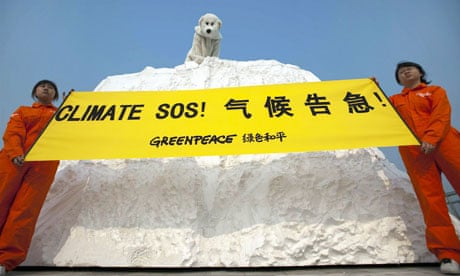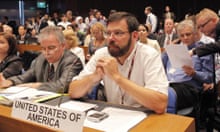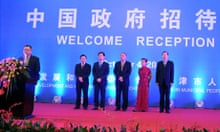The international community has edged closer to a climate deal after this week's talks in Tianjin, a top United Nations diplomat has insisted, despite a public rift between the two top carbon emitters, China and the United States.
UN climate chief Christiana Figueres said the latest round of discussions had paved the way for an agreement in Cancún in December.
"This week has got us closer to a structured set of decisions that can be agreed in Cancún," said Figueres, executive secretary of the UN Framework Convention on Climate Change (UNFCCC).
"I understand there is disappointment with the multilateral process but this issue is not easy. This is the greatest societal and economic transformation that the world has ever seen."
Several negotiators agreed there had been progress at the talks in Tianjin on how to transfer funds and technology from rich nations to developing countries.
Another step forward was a widening acceptance of the need for all parties to legally enshrine the emission reduction targets made last year at Copenhagen.
To do this, Europe and several other parties to the Kyoto protocol said they were willing to sign up – with conditions – to a second period after the end of the treaty's first term in 2012. The majority of developing countries also expressed a willingness to formalise their actions in a separate document.
But despite this convergence in the middle ground the two nations with the most at stake – China and the United States – continued to hang tough at opposite ends of the bargaining spectrum.
The top US negotiator, Jonathan Pershing, said there had been disappointingly little progress on the key issues of emissions targets and how to measure and report reductions.
"We hear here that we should save the tough decisions for later, but that will not work," he said. "It will not work to cherry pick some issues and not find a balance that will move us forward."
The US has accused China of backsliding on the Copenhagen accord, a claim rebutted by the hosts of the Tianjin talks.
Su Wei, China's chief negotiator, said: "The US, whether on reducing emissions or on providing funds or technology to developing countries, has taken no tangible steps or actions. On the other hand China has actively taken measures."
No effective action will be possible without the US and China. The hold-ups have exasperated other participants. The European Union said it was disappointed at the slow pace of progress, which had left a huge amount of work to do before Cancún.
"They are basically maintaining their positions, waiting for each other to move," said Laurence Gradd of the European commission.
China and the US are not the only nations holding back progress. Hopes for an advance on the crucial issue of forests – which help to absorb carbon dioxide – have come to nothing. Although this was an area where agreement seemed possible last year, conservation groups say Saudi Arabia and Papua New Guinea have pushed the process into reverse.
"It now looks like there might not be a deal on this at Cancún," said Peg Putts of the Wilderness Society. "This was supposed to have been a confidence-building exercise but discussions this week have been shatteringly awful."
After the chaos and bad blood last year at Copenhagen, there was relief that dialogue had even continued throughout the week without a complete breakdown.
"We haven't seen such a positive spirit of negotiation for many years," said Julie-Anne Richards of Climate Action Network. "This might not sound like interesting news. But compared to where we were before it is a real step forward."






